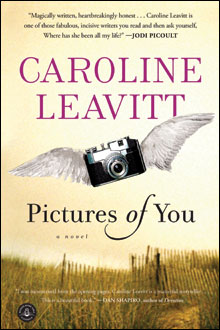
A GOOD DOMESTIC DRAMA There’s a page-turning pull to Pictures of You that will no doubt please readers who have come to count on Leavitt. |
Love, family, and the moments that change lives forever — these are the potent ingredients that Caroline Leavitt stirs up again and again in her fiction. An estranged, selfish sister is transformed when she agrees to help out with a bedridden sibling (
Coming Back to Me). The emotionally complex relationships and allegiances of an open adoption are examined from the perspectives of all concerned (
Girls in Trouble).
Pictures of You, Leavitt's ninth novel, opens with a car crash between two women on a foggy Connecticut highway. Each is driving away from her marriage, though for different reasons. Isabelle, 36 and childless, has left the Cape Cod town of Oakrose and the man she married as a teenager for a fresh start in New York. April, a young mother in a frilly, mysterious red dress, has also left Oakrose, heading who knows where with a backseat stowaway discovered moments before the two cars collide: her asthmatic, nine-year-old son, Sam. April is killed, the mystery of her destination dying (for the moment) with her. Sam and Isabelle survive.
Isabelle isn't charged; even so, she's plagued by guilt and the over-active imaginations of small-town types. Isolated and depressed (her husband is having a baby with another woman), she finds herself spying on Sam and his grieving father, Charlie, who, it turns out, live just six blocks away. At his school playground, Sam is the first to see and recognize Isabelle standing nearby; he becomes convinced that she's an angel who will help him talk to his dead mother. Circumstances (not always believable) conspire to draw the fated triangle together, helped along by Isabelle's immediate devotion to Sam and a reluctant but undeniable attraction between Isabelle and Charlie that sets the plot spinning to its conclusion.
There's a page-turning pull to Pictures of You that will no doubt please readers who have come to count on Leavitt for the satisfactions of a good domestic drama. Others may hope for more, or perhaps less — the author seems to be juggling too many plot elements, some not entirely believable or compelling. And though there are tidal waves of emotion plainly depicted in words on the page, much of it feels flat and unconvincingly ascribed to the characters. "Sam was right. He [Charlie] didn't know anything. He didn't know how his life had unraveled so completely. He didn't know how to live without April or how to be a single father or what to do with the roiling helplessness he felt each and every day."
Things do get better for Charlie, at least for a little while. He comes to trust the unexpected happiness and love he's found with Isabelle. But when Sam discovers the relationship, his stress-induced, life-threatening asthma attacks and the ensuing friction pull the once-happy trio apart. In the aftermath, each of the three is forced to grapple with this new, fresh loss and start over yet again.
Through all her story's twists and turns, Leavitt returns again and again to the passive decisions that shape her characters' lives, the points of "what if" and things left unsaid that change destiny's course. But she also shows the powerful force of "yes" moments, of active choices that acknowledge loss while clearing a difficult new path forward. In this regard, Isabelle is the book's true heroine. Uncertain and unmoored when we meet her, she finds a sharper, truer focus through work (most aptly, in photography) and love. A 20-year time lapse in the final pages gives us a glimpse of how things have played out — and Leavitt lets us draw our own conclusions.